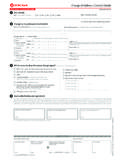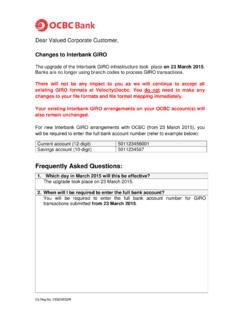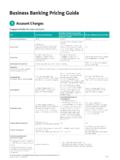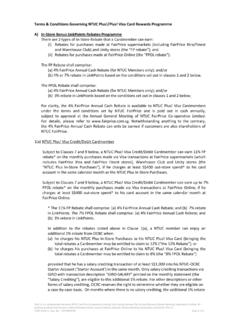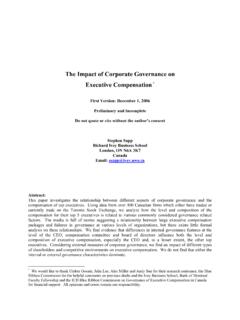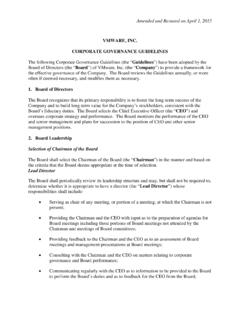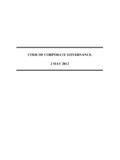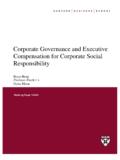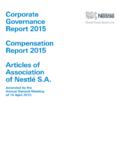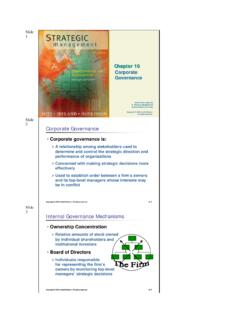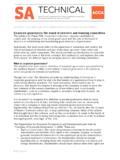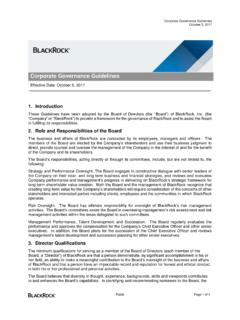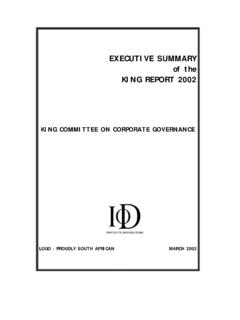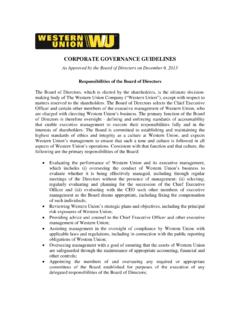Transcription of CORPORATE GOVERNANCE - ocbc.com
1 63 BUILDING ON OUR CORPORATE STRATEGY FOR SUSTAINABLE GROWTHCORPORATE GOVERNANCE A summary of the disclosures made pursuant to the Bank s CORPORATE GOVERNANCE arrangements are provided on pages 78 to 80 of this Annual Report. BOARD MATTERS PRINCIPLE 1: THE BOARD S CONDUCT OF AFFAIRSThe Board is elected by the shareholders to supervise the management of the business and affairs of the Bank. The prime stewardship responsibility of the Board is to ensure the viability of the Bank and to ensure that it is managed in the best interests of the shareholders as a whole while taking into account the interests of other stakeholders. The Bank has a board charter approved by the Board. Broadly, the responsibilities of the Board include the following: reviewing and approving overall business strategy as well as organisation structure, as developed and recommended by management; ensuring that decisions and investments are consistent with long-term strategic goals; ensuring that the Bank operates in such a way as to preserve its financial integrity and in accordance with policies approved by the Board; overseeing, through the Audit Committee, the quality and integrity of the accounting and financial reporting systems, disclosure controls and procedures and internal controls; and, through the Risk Management Committee, the quality of the risk management processes and systems.
2 Providing oversight in ensuring that the Bank s risk appetite and activities OCBC Bank is fully committed to integrity and fair dealing in all its activities, and upholds the highest standards of CORPORATE GOVERNANCE . The Bank complies with the Banking ( CORPORATE GOVERNANCE ) Regulations 2005 and adopts in all material aspects the principles laid down under the CORPORATE GOVERNANCE guidelines issued by the Monetary Authority of Singapore ( MAS ) that comprises the Singapore Exchange Securities Trading Limited ( SGX-ST ) s Code of CORPORATE GOVERNANCE 2012 (the Code ) and supplementary principles and guidelines prescribed by the consistent with its strategic intent, the operating environment and effective internal controls, as well as capital sufficiency and regulatory standards; overseeing, through the Risk Management Committee, the establishment and operation of an independent risk management system for managing risks on an enterprise-wide basis, the adequacy of the risk management function (including ensuring that it is sufficiently resourced to monitor risk by the various risk categories and that it has appropriate independent reporting lines), and the quality of the risk management processes and systems; reviewing any transaction for the acquisition or disposal of assets that is material to the Bank; ensuring that the necessary human resources are in place for the Bank to meet its objectives; reviewing management performance and ensuring that management formulates policies and processes to promote fair practices and high standards of business conduct by staff.
3 Establishing CORPORATE values and standards, emphasising integrity, honesty and proper conduct at all times with respect to internal dealings and external transactions, including situations where there are potential conflicts of interest; overseeing, through the Nominating Committee, the appointments, re-election and resignation of Directors of the Bank as well as the appointment, dismissal and resignation of senior management, ensuring that principles of transparency and meritocracy are observed; overseeing, through the Remuneration Committee, the design and operation of an appropriate remuneration framework, and ensuring that remuneration practices are aligned to and in accord with the remuneration framework; providing a balanced and understandable assessment of the Bank s performance, position and prospects, including interim and other price-sensitive public reports as well as reports to regulators; ensuring that obligations to shareholders and others are understood and met; maintaining records of all meetings of the Board and Board Committees, particularly records of discussion on key deliberations and decisions taken; identifying the key stakeholder groups, recognising that perceptions affect the Bank s reputation; and considering sustainability issues, environmental and social factors, as part of strategy formulation.
4 Board ApprovalThe Bank has documented internal guidelines for matters that require Board approval. Matters which are specifically reserved for Board approval, amongst others, are: material acquisition and disposal of assets; CORPORATE or financial restructuring; and share issuance, dividends and other returns to shareholders. 64 OCBC ANNUAL REPORT 2017 The Board approves transactions exceeding certain threshold limits, while delegating authority for transactions below those limits to the Board Committees and management to optimise operational efficiency. Board CommitteesWhile the Board has ultimate responsibility for the affairs of the Bank, various Board committees have been established to assist the Board in discharging its duties more effectively. The Board committees have clearly-defined terms of reference and changes to the terms require Board approval. The Board and its Committees maintain records of all meetings setting out in detail key deliberations and decisions taken.
5 The minutes of each Committee meeting are also circulated to members of the Board who are not members of that particular Committee. The composition and summary terms of reference of each of these committees are as follows. executive Committee The executive Committee comprises Mr Ooi Sang Kuang (Chairman), Dr Lee Tih Shih, Mr Quah Wee Ghee, Mr Tan Ngiap Joo, Mr Samuel N. Tsien and Mr Wee Joo Yeow. A majority of the Committee, Mr Ooi Sang Kuang, Mr Quah Wee Ghee, Mr Tan Ngiap Joo and Mr Wee Joo Yeow, are independent Committee has written terms of reference that describe the responsibilities of its executive Committee oversees within the parameters delegated by the Board the management of the business and affairs of the Bank and the Group. It reviews the Bank s policies, principles, strategies, values, objectives and performance targets. These include investment and divestment policies.
6 It also endorses such other matters and initiates such special reviews and actions as are appropriate for the prudent management of the Bank. Nominating Committee The Nominating Committee comprises Mr Tan Ngiap Joo (Chairman), Mr Ooi Sang Kuang, Mr Lai Teck Poh, Dr Lee Tih Shih and Mr Wee Joo Yeow. A majority of the Committee, Mr Tan Ngiap Joo, Mr Ooi Sang Kuang, Mr Lai Teck Poh and Mr Wee Joo Yeow, are independent Directors. The Committee has written terms of reference that describe the responsibilities of its Nominating Committee plays a vital role in reinforcing the principles of transparency and meritocracy at the Bank. It plans for board succession and ensures that only the most competent individuals capable of contributing to the success of the organisation are appointed. This includes reviewing all nominations for the appointment, election or re-election as well as resignations of Directors of the Bank and members of the executive Committee, Remuneration Committee, Audit Committee and Risk Management Committee.
7 The Nominating Committee is also charged with determining annually whether or not a Director is independent, capable of carrying out the relevant duties and qualified to remain in office. In addition, it reviews nominations for and dismissals or resignations of senior management positions in the Bank, including the Chief executive Officer ("CEO"), Chief Operating Officer, Chief Financial Officer, Chief Risk Officer and Chief Information Officer (Head, Group Operations and Technology). It makes recommendations to the Board on all such appointments, including the compensation package for offer of employment, promotion and cessation of employment. The Nominating Committee reviews obligations arising in the event of the termination of the contracts of service of executive Directors and senior management, to ensure such contracts contain fair and reasonable termination clauses. Audit Committee The Audit Committee comprises Mr Chua Kim Chiu (Chairman), Mr Lai Teck Poh, Ms Christina Ong and Mr Tan Ngiap Joo.
8 All the Committee members are independent Directors. Three members, including the Chairman, have recent and relevant accounting or related financial management expertise or experience. The members have not been partners or directors of KPMG, the external auditors, and none of them hold any financial interest in KPMG. The Audit Committee performs the functions specified in the Companies Act, the Code, the SGX-ST Listing Manual and MAS CORPORATE GOVERNANCE regulations and Committee has written terms of reference that describe the responsibilities of its members. The Board approves the terms of reference of the Audit Committee. The Committee may meet at any time and no fewer than four times a year. It has full access to and co-operation from management, and has the discretion to invite any Director and executive officer to attend its meetings. It has explicit authority to investigate any matter within its terms of information on the Audit Committee is provided under Principle 12 on pages 74 and 75.
9 Remuneration Committee The Remuneration Committee comprises Mr Wee Joo Yeow (Chairman), Mr Ooi Sang Kuang, Ms Christina Ong, Mr Quah Wee Ghee and Mr Tan Ngiap Joo. All are independent Directors well-versed in executive compensation matters, given their extensive experience in senior CORPORATE positions and major Committee has written terms of reference that describe the responsibilities of its members. The Remuneration Committee recommends to the Board a framework for determining the remuneration of executive officers, and reviews the remuneration practices to ensure that they are aligned with the approved framework. It is empowered to review the human resource management policies and the policies governing the compensation of executive officers of the Bank and its CORPORATE GOVERNANCE65 BUILDING ON OUR CORPORATE STRATEGY FOR SUSTAINABLE GROWTHB oardExecutive CommitteeAudit CommitteeName of DirectorScheduled MeetingScheduled MeetingScheduled MeetingHeld(1)AttendedHeld(1)AttendedHel d(1)AttendedOoi Sang Kuang5533 Chua Kim Chiu (2)11 11 Lai Teck Poh55 55 Lee Tih Shih5533 Christina Ong55 55 Quah Wee Ghee5533 Pramukti Surjaudaja55 Tan Ngiap Joo553355 Teh Kok Peng (3)33 Samuel N.
10 Tsien5533 Wee Joo Yeow5533 Nominating CommitteeRemuneration CommitteeRisk Management CommitteeName of DirectorScheduled MeetingAd hocMeetingScheduled MeetingScheduled MeetingHeld(1)AttendedAttendedHeld(1)Att endedHeld(1)AttendedOoi Sang Kuang2213366 Chua Kim Chiu (2) Lai Teck Poh221 66 Lee Tih Shih221 Christina Ong Quah Wee Ghee 3366 Pramukti Surjaudaja 66 Tan Ngiap Joo22133 Teh Kok Peng (3) 22 Samuel N. Tsien 66 Wee Joo Yeow2213366 Notes:(1) Reflects the number of meetings held during the time the Director held office.(2) Appointed to the Board and Audit Committee with effect from 20 September 2017.(3) Stepped down from the Board and Remuneration Committee with effect from 1 July , as well as the remuneration of senior executives and Directors. In addition, the Remuneration Committee administers the various employee share ownership schemes. In its deliberations, the Remuneration Committee takes into account remuneration principles, practices and standards that may be specified by MAS from time to time.
